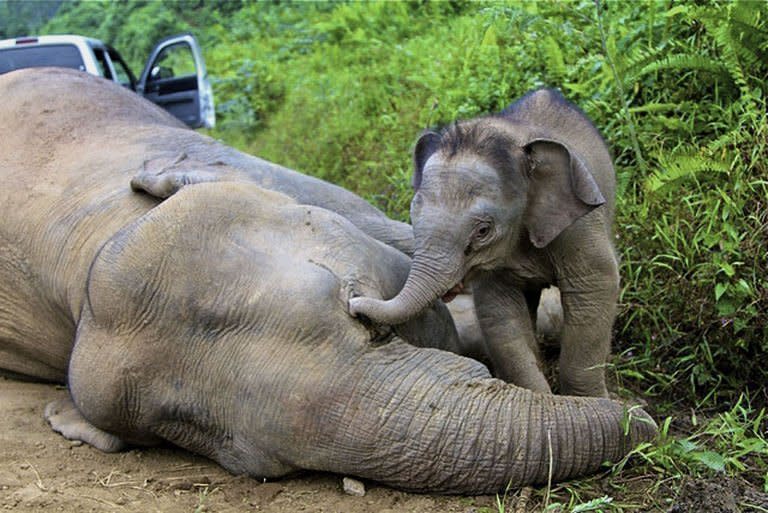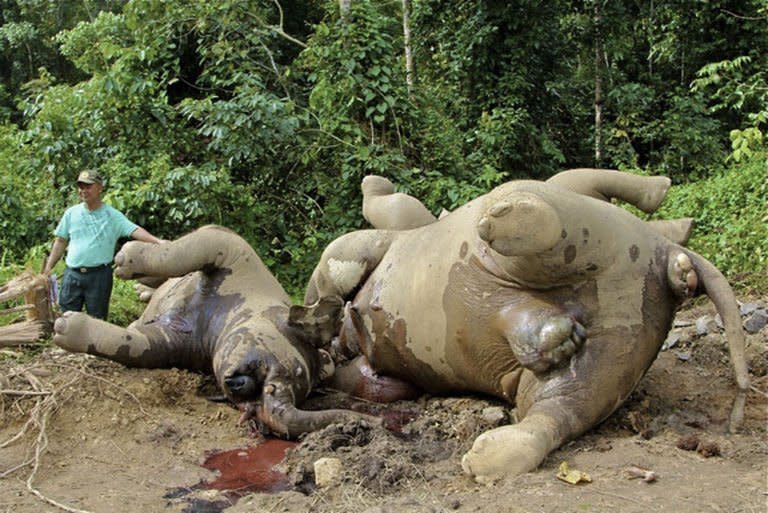Three more dead elephants in Borneo, toll at 13
Three more endangered Borneo pygmy elephants were found dead Wednesday in Malaysian Borneo of suspected poisoning, wildlife officials said, adding to 10 carcasses discovered earlier this month. They may have ingested poison spread by oil palm plantation workers to keep "pests" from eating the palm fruit, said Laurentius Ambu, wildlife department director of the Malaysian state of Sabah on Borneo island. He warned that the elephants travel in herds numbering up to dozens and still more carcasses could turn up. "We are trying to comb more areas. My hunch is that there may be more," he told AFP. "I don't think it's an accident." Ambu said three highly decomposed carcasses were found Wednesday in Sabah's remote Gunung Rara Forest Reserve not far from where officials found the 10 other dead pygmy elephants, a rare sub-species of the Asian elephant. State officials Tuesday released photos of the original 10 pachyderms, including a heartbreaking shot of a baby elephant nuzzling its dead mother. The young elephant appears unharmed and has been taken to a wildlife park in the state, Ambu said. A chemists' report on the 10 dead animals would be completed next week and could reveal what killed them, he added. WWF-Malaysia says about 1,200 Borneo pygmy elephants, which are smaller and have more rounded features than full-sized Asian elephants, are estimated to be left in the wild. Activists say deforestation -- for logging and to clear land for agriculture, especially palm oil plantations -- severely threaten the habitat of the elephants and other endangered Borneo wildlife. Borneo is a vast island shared by Malaysia, Indonesia and Brunei. Its once-vast rain forests, considered among the world's richest concentrations of biodiversity, are dwindling fast. Wild elephants have steadily been squeezed into smaller forested areas, giving rise to frequent confrontations with humans, but Ambu said the suspected poisoning incident is the first for Sabah. Poisoning is suspected due to severe ulceration and bleeding found in the animals' digestive tracts, he said. Dozens of wildlife officials, police and other personnel have been dispatched to comb through the Gunung Rara reserve for other possible victims. WWF-Malaysia in a statement blamed the deaths on rampant felling of forests by planters, which had forced elephants "to find alternative food and space, putting humans and wildlife in direct conflict". "The central forest landscape in Sabah needs to be protected totally from conversions," said executive director Dionysius S.K. Sharma. It also called for "frequent and large-scale patrolling" of forests to protect elephants, but admitted that was a "massive task" given the terrain and large areas involved. Palm oil plantations are considered a major threat to rain forests in countries like Malaysia and Indonesia -- sources of 85 percent of world palm oil supply. Palm oil represents about 35 percent of the global vegetable oil market. But its production is expected to soar due to its versatility, relatively high oil yields and economic importance to local communities.



